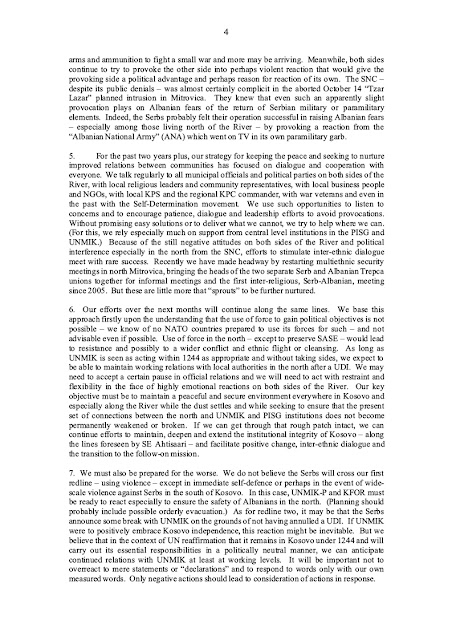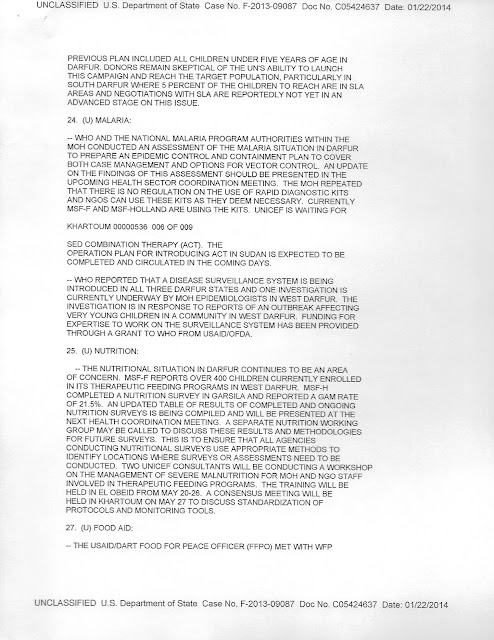Memorandum of Conversation
Internal
Memorandum
Subject:
SRSG’s meeting with the MAPs of Northern Municipalities
Date: 9
December 2005
Venue: Zvecan
Municipality
ISSUES
REQUIRING FOLLOW UP:
.
-
Establish further contacts on the Decentralisation Program.
Municipal
Assembly Presidents:
Mr. Dragisa
Milovic (DM) – Municipal Assembly President of Zvečan/Zvecan;
Mr. Slavisa Ristic (SR) - Municipal Assembly President
of Zubin Potok/Zubin Potok;
Mr. Velimir Bojovic (VB) - Municipal Assembly President
of Leposavic/Leposaviq
UNMIK
participants:
Mr
Søren Jessen-Petersen, Mr Gerard
Gallucci, Mr Petr
Ivantsov, Mr Henrik Villadsen,
Mr Devender Singh (Note taker),
Mr Jean-Luc Sintes, Mr Detlef Beisiegel, Mr Lameck Kawiche.
The
SRSG
briefed the participants on the beginning of the status
process noting that UNMIK is not part of the status process but would
support it within its mandate. While the Status process will focus on
politics, he would like to focus on the people. He underlined that
there will be many concerns and preoccupations in this crucial
period. UNMIK will promote closer collaboration with Belgrade and
Kosovo Serbs to focus on key issues so as to reassure Kosovo Serbs
that any status outcome would focus on their future. He was not
prepared to accept that
people should be let down if there was an unfavourable outcome.
The
SRSG
determined that there were five key areas to reassure Kosovo Serbs in
next few months: i) Standard Implementation process and how UNMIK can
push it; ii) Decentralisation as a fundamental issue with the ongoing
comprehensive reform focussing on minorities needs to be reassured
that they can manage their own affairs; iii) Freedom of movement and
focussing on Kosovo Albanians to do more in this area; iv) Belgrade
getting involved focussing on Kosovo Serbs residing in Kosovo; v)
Kosovo Serb representatives playing their role in key areas through
involvement in institutions and on practical issues. The
SRSG noted
encouraging results from the recent meetings held on practical issues
and felt there was scope for doing more in that area. He touched upon
the modest support provided by the SRSG to the Municipalities given
their enormous needs and hoped that it will lead to more.
The
SRSG then
stressed that security was basis of everything discussed in the
meeting and said that he was aware of immense concern about it. He
stated there had been deeply regrettable incidents over last weeks
and he condemned them. While it was important to resolve these
crimes, it could not be concluded if these were inter-ethnic or who
was responsible for these incidents. Nevertheless, psychological fear
was growing as a result of these incidents leading to diminished
freedom of movement. He informed that, after the bus incident near
Prizren, intensive additional steps are envisaged by Police and KFOR.
The SRSG
hoped that it will have the desired effect even though there were
some senseless people on all sides and it was difficult to stop it
altogether.
DM
thanked the SRSG for providing a general overview on Kosovo. He
agreed that while status talks are ongoing, they have to think of the
people and address their problems. He concurred with the SRSG that
security and freedom of movement are key problems. He claimed that
the level of violence was increasing and KFOR, Police and the
Municipality have to stop it. In this context, he referred to a bomb
thrown in a house in Mali Rudare in Zvecan Municipality. Recalling
recent release of Fatmir Limaj, DM
averred that it would encourage extreme Albanians to continue with
their designs. He affirmed that decentralisation was the key issue
needing resolution and characterised it as “a precondition for all
preconditions”. He favoured creation and establishment of
Municipalities with Serb majorities or with Kosovo Serbs and Kosovo
Albanians together with competencies about Health, Education,
Culture, Police etc. He called for horizontal connection between the
Municipalities and institutional linkages with Serbia. Referring to
Romas in Zitkovac camp and IDPs from Svinjare and Obilic displaced in
Zvecan, he asserted that it was time to provide possibility for IDPs
to return to their homes. DM
argued that it was difficult to get into the institutions while two
thirds of the population is displaced elsewhere. Highlighting high
unemployment rate (60%), he urged all concerned to provide new
opportunities so that people can stay here. He mentioned that he was
interested and sensitive to the problems of North Mitrovica because
many of these impacted on Zvecan. DM
underscored
that status problem could be solved in Kosovo with compromise and
respecting the interests of both sides. Finally, he thanked the SRSG
for his support for the project, which he said was important for
their municipality.
VB
expressed agreement with DM and stated that they have to be prepared
for a decision that they may not like. He expressed fear that status
of Kosovo may be resolved as a future for Albanians but not for
Serbs. He recalled the meeting of 13 Kosovo Serb representatives with
the Status Envoy where all of them expressed their unanimous view
that any decision other than independence could be accepted. He
opined that relations between Kosovo Albanians and Serbs had been
negative all their lives, not just last six years. Recalling that his
municipality was connected to the then autonomous province of ‘Kosovo
and Metohija’, he wondered how a Municipality with 99% Serb
population could be called an ‘Albanik’ Municipality. VB
said he could not accept that Kosovo Albanians were asking for
independence only and nothing else. Referring to disrespect of human
rights for last six years, he claimed that Kosovo Albanians would
behave better as status talks progress but it was not in their
hearts. Taking out a map, he reminisced how his father had to leave
Suva Reka Municipality to settle in North Kosovo and now his grandson
may have to do the same. He contended that any unsuitable decision
from the international community would not create stability in the
region. VB
felt that if final status is independence, not a single Serb will
remain in this area; hence a solution to somehow satisfy both sides
should be found. Pleading for objectivity on both sides, he mentioned
that there were many models which could be followed so that both
communities could live a normal life.
SR
mentioned that while burden of status talks had shifted to Mr
Ahtisaari, UNMIK has obligation in non-status areas. He specifically
referred to Standard Implementation, which he admitted was a process
that can’t be accomplished overnight. He stressed that UNMIK will
have to be very determined to make concrete progress on
decentralisation and it was SRSG’s obligation. He felt that the
Albanian’s wish for an independent state is really to have central
power over the Serbs. The IC must prevent creation of that kind of
central power. He elaborated decentralisation as transferring
authority and power from central level to local levels and not only
creating new Municipalities. He added that diminishing budgetary
support every year does not augur well for good future. SR
mentioned
two villages (Banjë/Banja
and Suvogërll/Suvo Grlo)
in Skenderaj / Srbica
Municipality, which want to be connected to Zubin Potok Municipality
not only for security but other reasons as well. These were
multi-ethnic villages and if a decision in the context of
decentralisation allows this, he would have no objection. He also
pointed out that there were many such villages, where Serbs no longer
reside but will return if connected to Zubin Potok. He claimed that
he had no territorial ambitions. Finally, he said they were ready for
all solutions to status issue. SR also appealed to his colleague
from Leposavic to not leave the rest of them alone in Kosovo.
The
SRSG concluded the meeting by
thanking all the participants for their contributions and responded
that he had not come with any message about a decision that they may
not like but that it was good to prepare for whatever may come.
Appreciating their comments about decentralisation, he said he was
convinced that it will be a key feature of any status outcome. Kosovo
Albanians will have to realize a decentralisation program that leads
to a Kosovo for all communities. If such decentralisation does not
emerge, the Status Envoy will ensure that decentralisation is
integrated with status process with a strong focus on what
communities need. He welcomed all comments especially on multi-ethnic
municipalities. The SRSG recognized
that while regular progress could not be made on returns, UNMIK was
making progress on Romas in lead affected camps. Camp Oesterode is
being prepared as a transit facility for those Romas in the camps,
who want to move there. It will be a step on way to their formal
return to Roma Mahalla
12 December
2005

























































